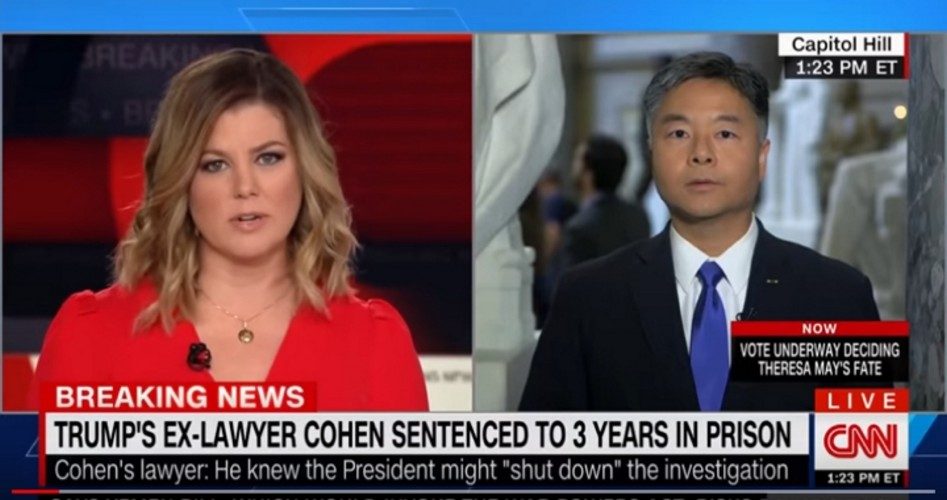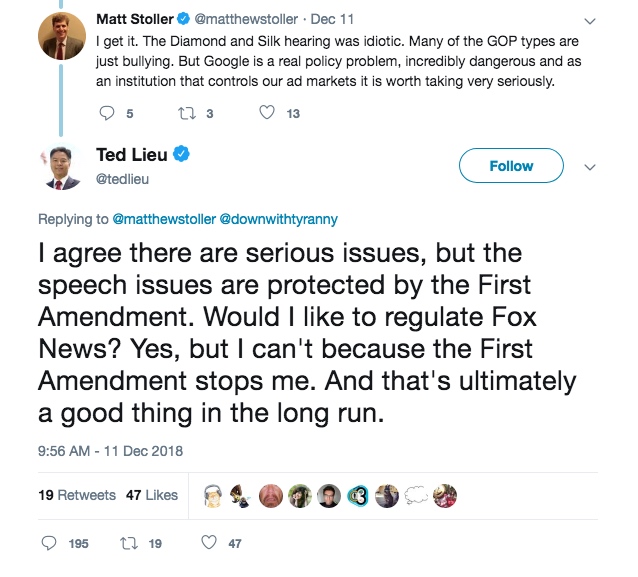
It’s what you get when electing a leftist in lieu of a real patriot: Ted Lieu. The California Democratic congressman created quite a stir Wednesday by expressing love — for regulating Americans’ speech.
As the Washington Free Beacon reports, “Lieu got attention a day earlier when Google CEO Sundar Pichai testified at a House Judiciary Committee hearing, assailing conservative claims of the tech giant’s bias against them by reading positive and negative stories about Republican Reps. Steve Scalise (La.) and Steve King (Iowa).”
“After CNN host Brianna Keilar praised Lieu for the ‘clever’ stunt,” the Beacon continues, “she wondered if Democrats should have used more of their time to question the Google leader about how it and other tech companies can work to prevent the spread of conspiracy theories and other online trolling.”
“It’s a very good point you make,” Lieu responded. “I would love if I could have more than five minutes to question witnesses. Unfortunately, I don’t get that opportunity.”
Then Lieu uttered his memorable line, saying, “However, I would love to be able to regulate the content of speech. The First Amendment prevents me from doing so, and that’s simply a function of the First Amendment.”
In fairness, Lieu did qualify the above by with, “But I think over the long run, it’s better the government does not regulate the content of speech” (video below).
To be fair again, as opposed to just seeking to score political points, some nuance should be added here. Lieu’s statement about regulating speech was in response to a left-wing journalist who was essentially complaining about “fake news,” and he was basically saying (in an imprudent way), “I agree with you about the problem, but it’s not really the government’s role.”
(For the record, I don’t believe this is a principle-born position; I suspect that if Google were censoring leftists, his conception of government roles would transform.)
Moreover, his statement did seem like a common “If I were king” remark, where a person is sometimes saying, in so many words, “On an emotional level, I’d love to do this or that, but I know intellectually it’s not a good idea.” This was reflected in a little Twitter exchange Lieu had (below).

The problem? Understandably, many Americans don’t want to hear an elected official talking about his love for controlling speech no matter what the underlying meaning. Second, given that Lieu’s leftist fellow travelers have authored Truth-stifling political correctness; create speech codes in workplaces, colleges, and elsewhere; and continually ruin careers over unfashionable use of the tongue, many are disinclined to view his statement innocuously.
As for me, my opening line about Lieu’s lacking patriotism alluded not to his recent statement in particular, but his general support for anti-American leftism. Speaking of which, his stunt regarding Google and the GOP congressmen was rhetorically effective, but reflected either ignorance or deceit.
In reality, the censorship of conservatives by Google and big tech in general is real and is effected in such a way that most people don’t even know it’s occurring. However, I’ve reported on it, explaining, among other things, how Google buries my articles, consigning them to Internet Siberia.
Also note that psychologist Robert Epstein — who emphasizes that he’s “not a conservative” — warned in August that Google and Facebook alone have the power to shift “upwards of 12 million votes” during an election.
Of course, the world’s Lieus only exacerbate this problem. He also told CNN that he “would urge these private-sector companies to regulate” speech better themselves — which only means they’ll be shifting even more votes.
To add nuance again, it is true that no society in world history has ever allowed people to say whatever they wanted free from even social consequences. For example, voicing the wrong ideas in early America could get you “warned out of town”; later, scorn and ostracism would always attend espousing Nazi or Marxist beliefs or having an overtly vulgar or lewd mouth.
So it’s not a question of whether we’re going to have social speech codes and their attendant punishments, but only what they’re going to be — and who will devise them.
The problem today is that we live in a morally inverted world where bad is called good and good, bad. Soy-boy social-just(us) warriors get bent out of shape over the song “Baby, It’s Cold Outside,” “microaggressions” (a concern of micro-minds), and someone having used the term “queer” when he was 15, but bat not an eye over “hooking up” like animals; rampant porn use, vulgarity, and sacrilege; and the sexual devolutionary agenda in general. As late Soviet defector Yuri Bezmenov put it years ago, they have been “demoralized” — they have moral compasses warped almost beyond repair.
So who among the powers-that-be are fit to effect censorship? The market certainly isn’t perfect; why, it has helped give us much of what I lamented above (e.g., porn) along with prominent rap-thug stars, and a Sodom and Gomorrah culture. Yet the “market” here is at least a form of economic democracy, with people’s daily purchasing choices essentially being “votes” determining what product-or-service “candidates” will be “elected.” Would we prefer the determinations made by a tech oligarchy, a gaggle of gutless Google governors?
Philosopher Friedrich Nietzsche, who as an atheist’s atheist was hardly a modern “conservative,” once noted, “Liberal institutions cease to be liberal as soon as they are attained: later on, there are no worse and no more thorough injurers of freedom than liberal institutions.”
Today, the liberal institutions that are perhaps the planet’s biggest and most powerful, are Big Tech.
Image: screenshot from YouTube video of Ted Lieu interview



